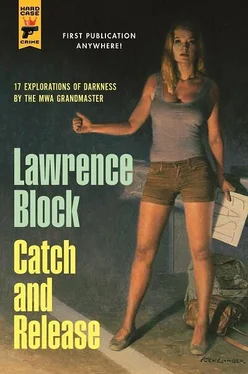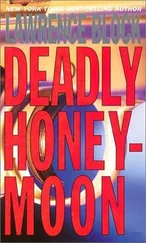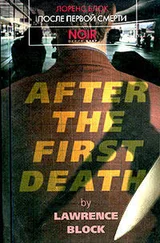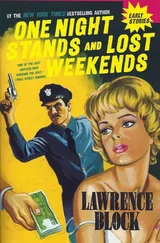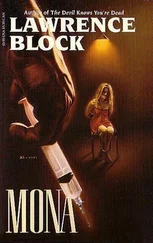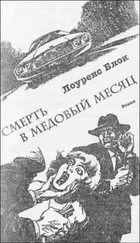I suspect you can guess at the rest. Maybe he ran up against some card sharps, or maybe the cards just weren’t running his way. He never knew for sure, but what he did know was that he reached New York with nothing in his kick but the five hundred dollars of case money he’d tucked away before he started. Everything else was gone, invested in straights that ran into flushes, flushes that never came in, and bluffs some other guy called. You’d think he’d be desolate, wouldn’t you? He thought so himself, and was surprised to discover that he actually felt pretty good. If you looked at it one way, he left Germany with eighty thousand dollars and landed in New York with five hundred. But there was another way to see it, and that was that he had five hundred dollars more than he’d had when he left Iowa in the first place, and he’d been shot twice and lived to tell the tale, and he had a Bronze Star to keep his two Purple Hearts company, and he knew as much about women as anybody in Iowa, and more about art. The money he’d had, well, in a sense it had never been real in the first place, and, as for the paintings he’d trafficked in, well, they hadn’t been real either. They’d all of them been stolen, and they had no provenance, and sooner or later they could very well be confiscated and restored to their rightful owners. He figured he’d done just fine.
“Soldier? Have you finished?”
The soldier looked up, blinked. “More or less,” he said. “Why? Don’t you like the story?”
“It’s a fine story,” the doctor said, “but isn’t it unfinished? There’s a sense of closure, in that our hero is back where he started. That’s if he went back to his family’s farm, which I don’t believe you mentioned.”
“Didn’t I? Yes, he returned to the farm.”
“And to the girl he left behind him?”
“I don’t believe there was a girl he’d left behind,” said the soldier, “and if there was, well, she’d been left too far behind to catch up with him.”
“That must have been true of the farm as well,” the priest offered.
The soldier nodded. “That proved to be the case,” he said. “He had, as it were, seen Paree — and Madrid and Geneva and Zurich and Berlin, and no end of other places more stimulating than an Iowa cornfield. He’d spent two days in New York, waiting for his train, and he’d spent much of it at the Metropolitan Museum of Art, and in the galleries on upper Madison Avenue. He stayed in Iowa for as long as he could, and then he packed a bag and returned to New York.”
“And?”
“He found a cheap flat, a fifth-floor walkup in Greenwich Village for $22 a month. He made the rounds of the art galleries and auction houses until he found someone who was willing to hire him for $40 a week. And, gradually, he learned the business from the ground up. From the very beginning he saved his money — I don’t know how he could have saved much when he earned forty dollars a week, but he managed. Half of it went into a permanent savings account. The other half went into a fund to purchase art.
“Years passed. Although there was often a woman in his life, he never married, never formed a long-term alliance. Nor did he move from his original apartment in the Village. The neighborhood became increasingly desirable, the surrounding rents went up accordingly, but his own rent, frozen by the miracle of rent control, was still under a hundred dollars a month twenty-five years later.
“His capital grew, as did his collection of prints and paintings. The time came when he was able to open a gallery of his own, stocking it with the works he’d amassed. Rather than represent living artists, he dealt in older works, and on more than one occasion he was offered work he recognized from his time in Germany, stolen paintings he’d brokered years ago. Since then they’d acquired provenance and could be openly bought and sold.
“He’s in the business today. He could retire, he’ll tell you, but then what would he do with himself? He walks with a cane, and on damp days he feels the pain of his second wound, the rib broken by the machine-gun bullet. It’s funny, he says, that it never bothered him once it healed, and now it aches again, after all those years. You think you’re done with a thing, he’ll say philosophically, but perhaps no one is ever done with anything.
“He’s respected, successful, and if I told you his name, which is certainly not Gary Carmody, you might very well recognize it. There were rumors over the years that he occasionally dealt in, well, not stolen goods exactly, but works of art with something shady about them, and I don’t mean chiaroscuro. But nothing was ever substantiated, and there was never a scandal, and few people even remember what was once said of him.”
“And that’s the end of the story,” the policeman said.
“Well, the man’s still alive, and is any story ever entirely over while one lives? But yes, the story is over.”
“And what does it all mean?” the priest wondered. “He was a rather ordinary young man, not particularly greedy, until circumstances created a great opportunity for greed to flourish. Greed led him into a marginally criminal existence, at which he seems to have thrived, and then his circumstances changed, and he tried to change with them. But greed led him to try his hand at poker—”
“Even as you and I,” murmured the doctor.
“—and he lost everything. But what he retained, acquired through greed, was a love of art and a passion for dealing in it, and as soon as he could he returned to it, and worked and sacrificed to achieve legitimate success.”
“Unless those rumors were true,” the policeman said.
“It’s a fine story,” the doctor said, “and well told. But there’s something I don’t entirely understand.”
“Oh?”
“The Vermeer, Soldier. He was working for nothing and living on less. My God, he must have been scraping by on bread and water, and it would have been day-old bread and tap water, too. Why couldn’t he sell the Vermeer? That would have set him up in business and kept him living decently until the gallery started paying for itself.”
“He fell in love with it,” the policeman offered. “How could he sell it? I daresay he still owns it to this day.”
“He does,” the soldier said. “It hung briefly on the wall of his room in the farmhouse in Iowa, and for years it hung on a nail in that fifth-floor Village walkup. The day he opened his own gallery he hung it above his desk in the gallery office, and it’s still there.”
“A lucky penny,” the doctor said. “‘Keep me and you’ll never go broke.’ And I’d say he’s a long way from broke. I haven’t priced any Vermeers lately, but I would think his would have to be worth an eight-figure price by now.”
“You would think so,” the soldier allowed.
“And he wouldn’t part with it. Is that greed, clinging so tenaciously to that which, if he would but let it go, might allow him to reach his goals? Or is it some other sin?”
“Like what, Doctor?”
“Oh, pride, perhaps. He defines himself as a man who possesses a Vermeer. And so it hangs on his crumbling wall while he lives like a churchmouse. No, make that like a ruined aristocrat, putting on a black tie every night for dinner, setting the table with Rosenthal china and Waterford crystal, and dining on stone soup. Made, you’ll no doubt recall, by simmering a stone in water for half an hour, then adding salt.”
“An old family recipe,” the policeman said. “But would the painting be worth that much? An eight-figure price — that’s quite a range, from ten to a hundred million dollars.”
“Ninety-nine,” the doctor said.
“I stand corrected. But if it increased in value from fifty thousand dollars to — oh, take the low figure, ten million. If it performed that well, how can you possibly argue that he should have sold it? He may have struggled, but it doesn’t seem to have harmed him. Who can say he was wrong to keep it? He’s a success now, he’s been a success for some years — and he owns a Vermeer.”
Читать дальше
